Our Solar Power System recently got a real-world workout before and during the weekend. It's still fairly new to us, just 3 months old.
As just a quick review, we installed a 32 panel system rated at 13kWh, and 4 Enphase Battery Backups rated at 5kWh each (20 kWh total battery). For more technical details, see my Previous Post Here.
Like most of Florida, we were impacted by Hurricane Milton last week. We were lucky enough to be just outside the "power cone", but still had winds over 60 mph and received over 12 inches of rain in a day, along with about 3 inches the day before and the day after. That's the most rain I've ever seen personally in one day.
As a result of the storm we lost power from the Grid Wednesday night when the main storm front started getting closer. It was initially predicted to be out for 8 days, but they actually got it restored for us today (Sunday). In this pic, you can see where we lost power a little after midnight (that little bit of black color on left of the graph is the "imported from grid power")
Day 1 (Outage starts just after 1am)
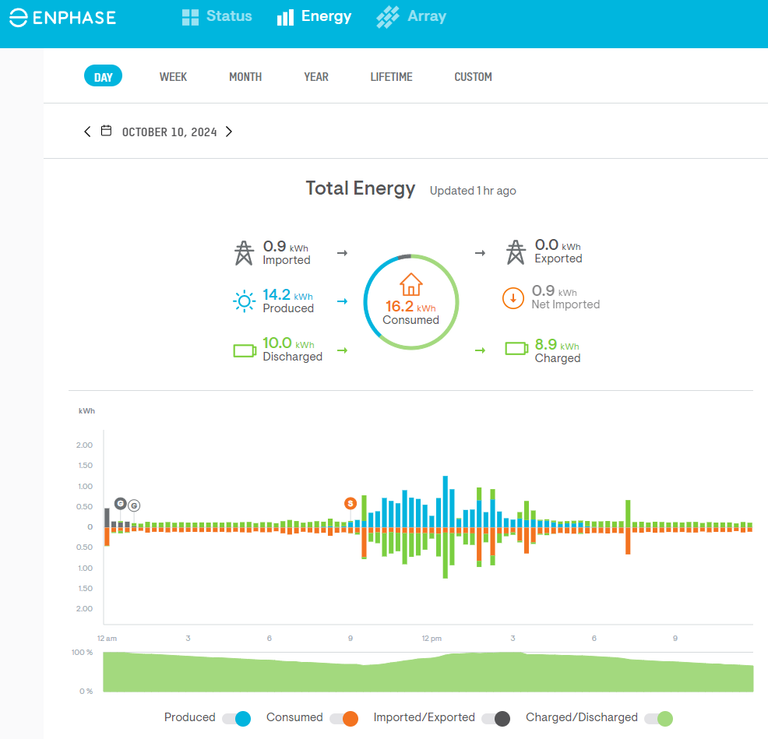
To Maximize our backup battery time, I had turned off our AC units before bed along with anything else non-essential just in case the power went out. This is what the power usage was that first night and full day. I did leave our router and internet connection live, along with our computers. Other main essentials were the freezer, refrigerator, whole house water filter, and occasional lights and even select ceiling fans during the day.
We stayed very conservative those first two nights/days using only about 16 or 17 kWh of power. This is compared to our normal daily use of 70-85 kWh when we are on-grid and have the AC and other things running (120-130 kWh days when we drive up to Jacksonville and I'm charging the vehicle after several hours of driving).
I was a little scared of running out of battery at first. The initial warning told us we were Off-grid and estimated running time of about 7 hours. We were sweating if we would make it until morning that second night, but then discovered that it calculates time remaining based on the last 24 hours usage (when the AC and everything else was running). It was much more accurate the next days after running on battery only and restricted use for the 24 estimation period.
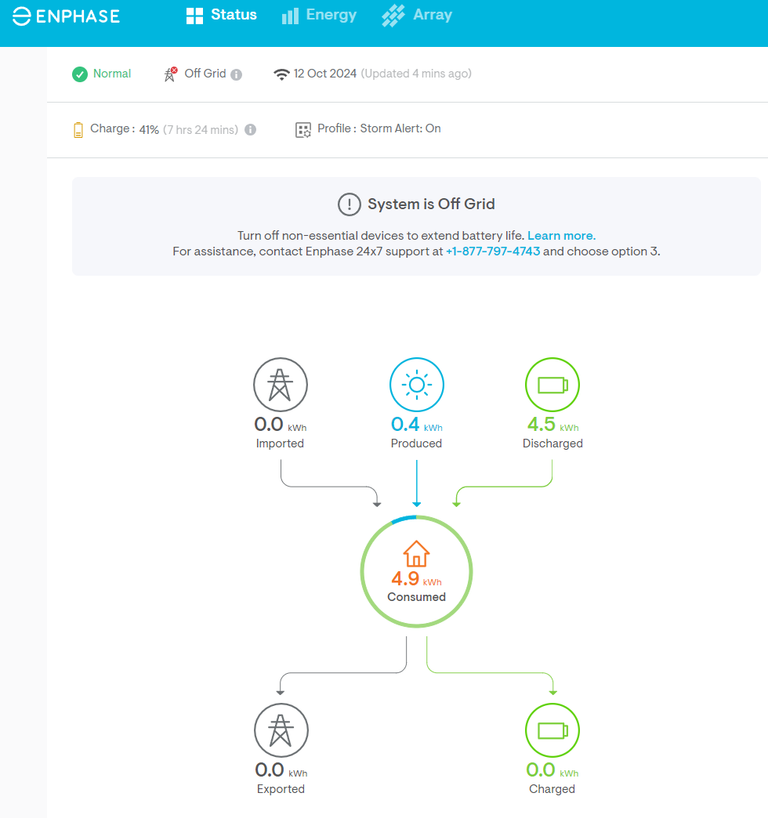
When we woke up Friday Morning, it showed that we had 41% charge left, or about 7 hours of the same usage.) This was still about 2 hours before we would start producing any power for the day, about 4 hours until we would produce enough to keep up with the usage and begin recharging the backup batteries.
Day 2 (Off-Grid)
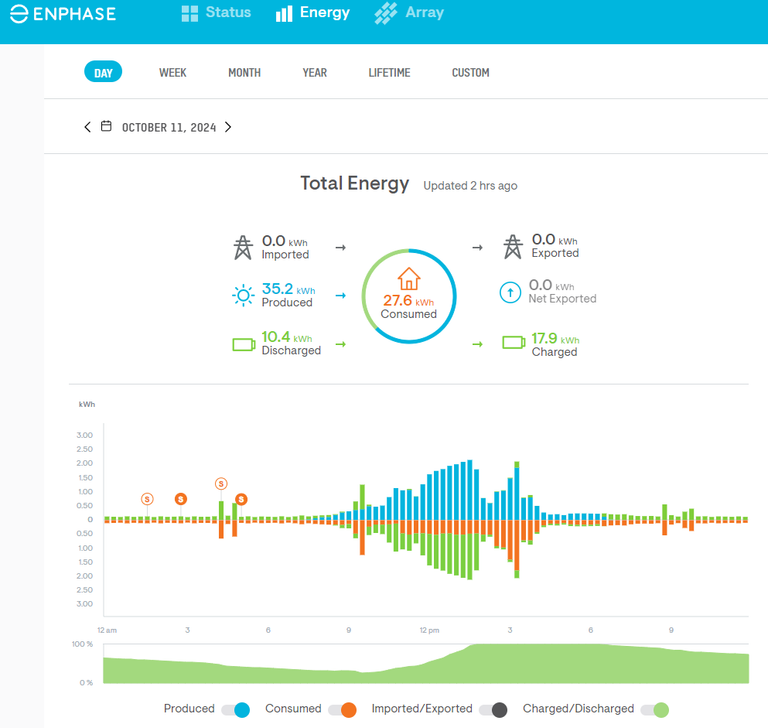
It was still completely overcast the entire day on Friday the 11th, and I was concerned if it would be able to produce power, but it was still able to produce enough to bring us back to 100% and even allow us to run other things like the dishwasher, sewing machine, TV and such during the peak hours without risking the battery being fully charged for the night.
Day 3 (Off-Grid)
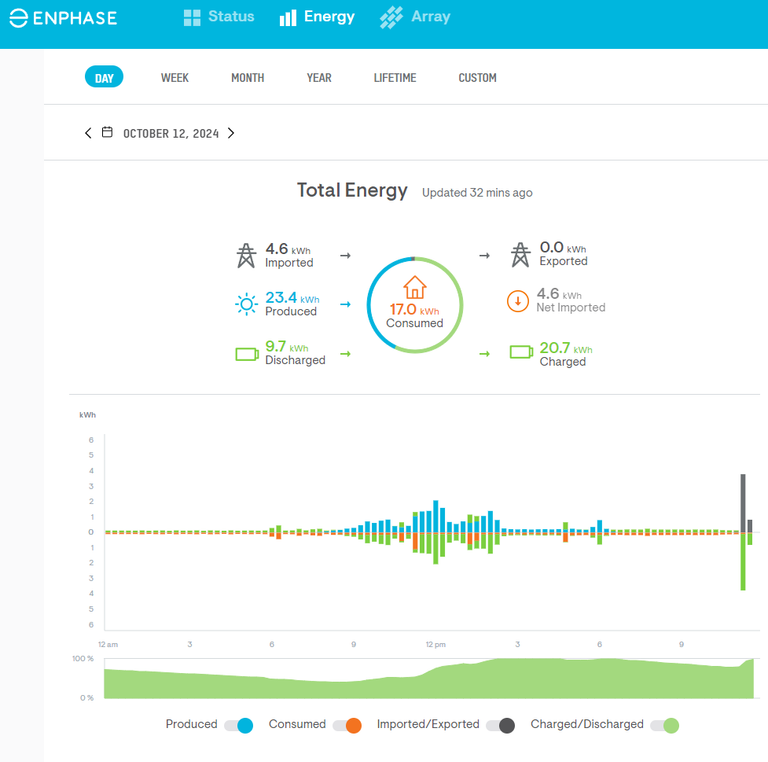
Saturday the 12th was another low production day with only 23.4kWh produced to recharge the backup batteries. It was another day mixed with clouds and rain, with only occasional real sunlight breaking through. You can see where the grid was restored in black on the far right.
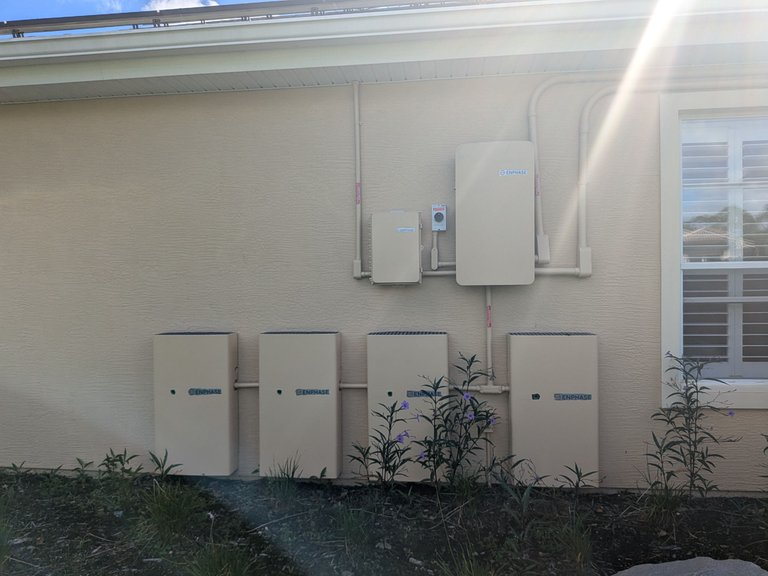
We were very glad to have these battery backups in place before the storm. It's definitely not fun for us to just leave like some people do. With a 120 lb. dog and three cats, dragging off to a hotel for a week is not a pleasant experience. Even worse when the whole state is in emergency response mode.
Overall in Florida, Over 1,779,580 customers were without power for multiple days, according to the FPL website. Over 173,230 in our county alone. Even today while we have power back, there are still over 218,324 that do not with many estimated not until Thursday end of day. Major flooding in a lot of areas, although we were lucky enough to not have been impacted directly by the floodwaters.
Friday Power Outage Map (Courtesy of FPLMaps.com website)
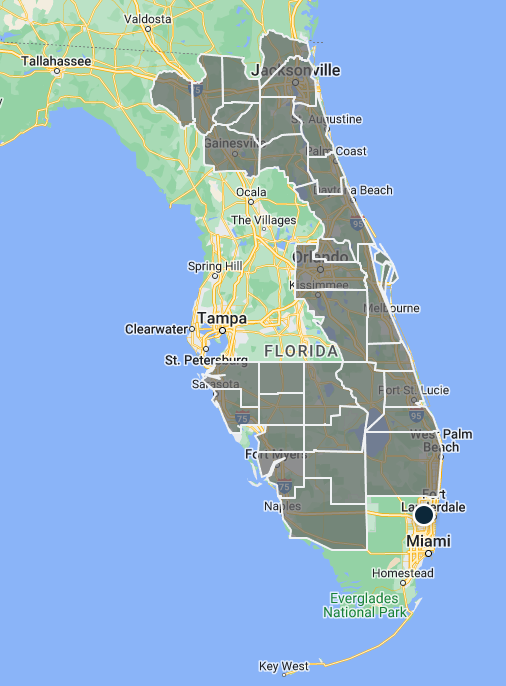
Sunday Power Outage Map (Courtesy of FPLMaps.com website)
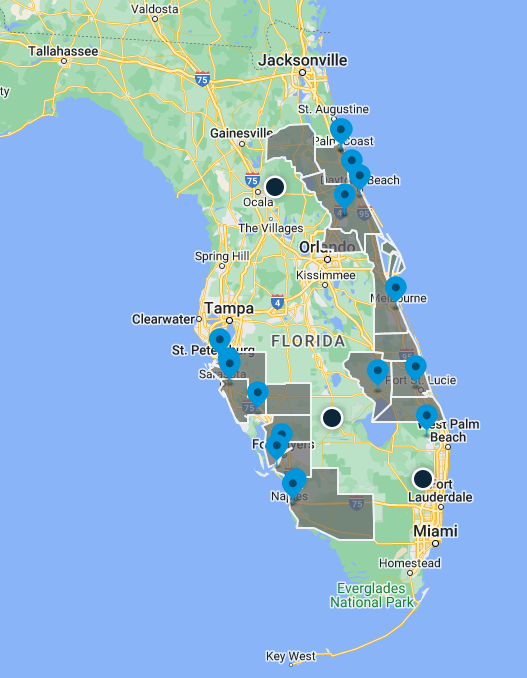
We did have local tree damage.
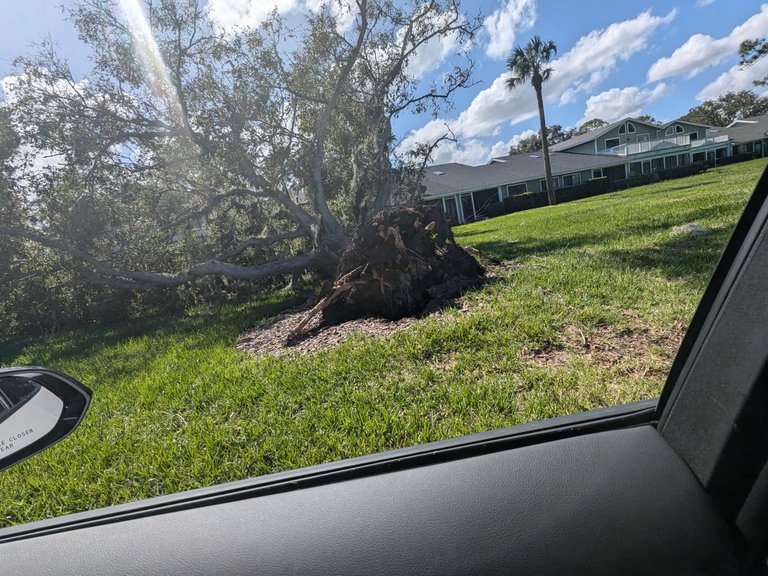
And nearly everyone in our neighborhood had to clean up a pile of branches and leaf litter, etc. like this. I had 5 plastic bags and a large branch pile 4x this size. Their pile made a better pic with that lovely Agave plant :)
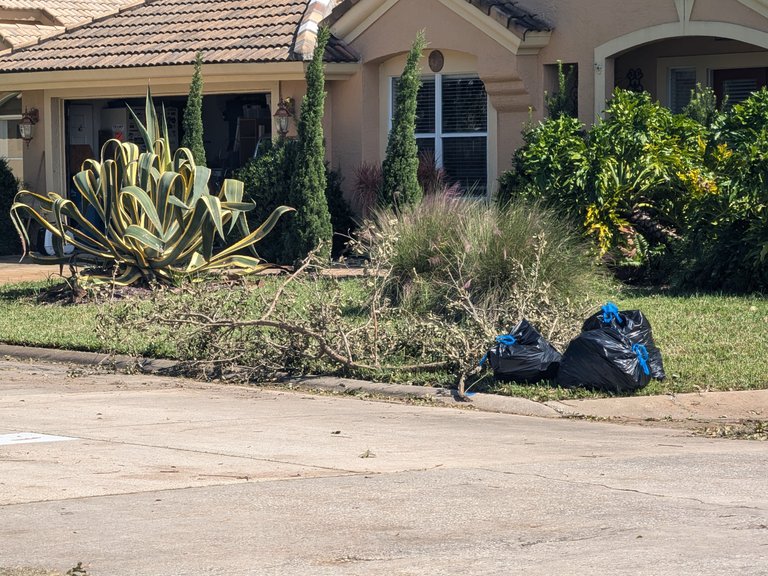
Hurricane's are messy!
If you've read this far, here is some other interesting info we learned:
- Our "Essentials" mode uses about .3 to .6 kWh of power.
- The LG 72 inch TV and Amazon Sound Bar uses about .3 kWh of power (hehe, yes we allowed ourselves that luxury a couple hours in the evenings, even though it cost us that same time in essential power). Else we used our laptops/tablet screens for news and connectivity.
- The dishwasher uses about .5 to 1kWh of power.
- The pool filter uses about 1 to 1.5 kWh of power (shut off during outage).
- Ceiling fans used about .1 kWh of power or less.
- Apparently the smartswitch slows down Solar production if the batteries are 100% and the Consumption is low. We saw that in the afternoon when we would normally be producing 7-9kWh from the panels, the production would rate limit itself down to only producing what was needed. This extra power would normally feed back to the grid.
How does the Solar compare for an outage?
We had a nice Generac Propane whole house generator in Vermont. While it worked very well, I must say that I like this setup MUCH better. It's both a personal and a location thing. I would probably want the propane in Vermont given it's severely limited sunny days.
Here in Sunny Florida though, I like this setup MUCH better. The main reasons are the noise of that thing running (even here we could hear at least three neighbors running, but at least they were mostly away from our house. Another is the annual maintenance for Propane or gas, oil changes, spark plugs, startup battery charging, monthly testing, etc...
Also interesting was the struggle many had with getting gasoline for their generator's or even vehicles. Unlike the old days where gaps pumps were manual, nearly all of them nowadays require electricity to swipe credit cards or even just to pump the gas and apparently don't work even if you have cash. With our electric car, I could also fill it up each day (as long as sunny) without having to drive 50 miles to find an open gas station like one of my neighbors did.
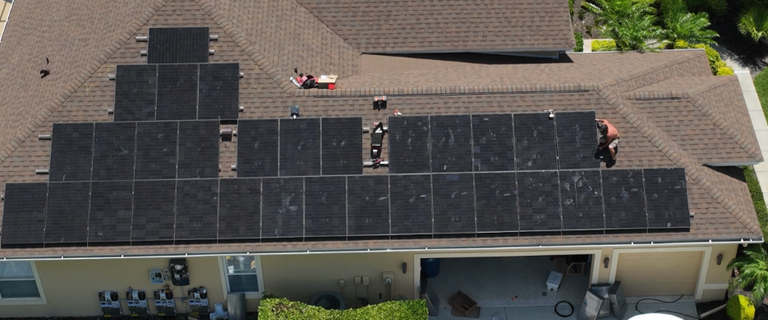
Overall, Double thumbs up. I'm glad I went this direction and would certainly do it again. We could easily have continued the 8 days predicted if needed. The only negative is that I would really like to double the size of my battery bank for that extra battery time and piece of mind, and maybe another 8-12 panels for faster charging, and to catch some light earlier in the morning. With that increase we could easily go completely off-grid and use all power normally except maybe during peak summer AC use June-Sept. Having seen this preview of no AC use though, I am even more excited to see how much we save and put back into the grid when AC is turned off completely for the fall/winter.
It always feels like a kick while down when the power goes out.. gotta run the batteries over night. And then no sunshine the next day to recharge.
Glad you were able to fully recharge though.
Moments like that a generator is nice to have.
Glad you were able to test your solar array and batteries hopefully no wind damage happened. We had a power outage about a month ago. It went pretty smooth with a charged battery array and having the generator too. Needed to dial in the hertz a little different for the generator but that is it so far for issues... Otherwise the hertz would shift too much from the generator and make the inverter reboot.
Good info about the hertz shift, thanks! I'm still debating if we buy a portable generator gas or propane for potential longer outage without sun as you say. Although with events the size of these hurricanes, I've discovered it often makes buying gas or small propane tank refills difficult with sometimes great travel distance needed. We don't really have the space here to keep enough on hand, and don't want to buy or pay for the larger burined Propane tank and setup.
Buying more batteries is expensive though. I'm definitely on a track to buy the bi-directional vehicle charger from Enphase when they come out. That will add at least another day or two for the house if needed and I think give me the comfort level I'm looking for.
We've had a GREAT day today. The weather has cooled enough that we are not running the AC for a couple days and the average power curve looks like this! 56.7 kWh produced and 47.1 kWh exported back to the grid. Woot! Gonna love seeing the power payback next month from days like that.
Its certainly a great asset in times when the main power grid is down. Always assuming that the panels are not being damaged by the storm as well. And that the sun comes back soon.
But the battery backup can prevent the worst, I guess, if you are not wasting too much power for unneccessary things. I have been wondering, for example, what happened to the food in deep freezers and fridges of the people, if the power is down for several days. I guess that can lead to a significant financial loss. And a nasty smell.
Yes, exactly right on the damage part. They are pretty resilient though, and the solar install folks claim they actually strengthen the roof. I'm not sure about that, but they definitely provided shade for that afternoon sun facing roof over our garage and dramatically lowered the temperature in the attic/garage by shading that side of the roof that was previously hit by full sun. The potential for damage is another reason I am a fan of the individual micro-inverter type setup, so that if one or more panels damaged, the others keep producing.. Yes, many of our neighbors had significant cost for food loss in fridge and freezers. We have a quarter cow plus other stuff in ours that thankfully was saved and not at risk. Plus it was nice to have the cold drinks handy!
I only have a small freezer for a single household, but even that would mean a loss of a few hundred Euros, I guess. I would not be happy if all the stuff spoils.
I'm all for that kind of energy, it's clean and smart. And you could see how beneficial and efficient it is even in the midst of such deteriorated weather. Great! Milton gave you the chance to learn a bit more about your investment.
I'm glad you were away from the eye of the hurricane.
Thanks. It's been quite enjoyable learning more about the technology and how it works.
We are also glad to have been a little out of the worst part of the storm. Many did not fare as well are still struggling to recover.
Yes, I know it was terrible. We here were worried because my sister lives in Orlando and my cousin lives in Miami. Fortunately, they had no problems either.
Well our Spectrum Internet went out Sunday night after the grid power came back on. Just got it back this evening. Yay! It was pretty stressful trying to work a new job and have meetings on the lame mobile phone hotspot that also had spotty LTE connectivity. I've sure become spoiled on the bandwidth!
Congratulations @ksteem! You have completed the following achievement on the Hive blockchain And have been rewarded with New badge(s)
Your next target is to reach 6500 replies.
You can view your badges on your board and compare yourself to others in the Ranking
If you no longer want to receive notifications, reply to this comment with the word
STOPWe lost power for about 16 hours during Milton. I would love to have solar but it just isn't in the budget. Also, unless I could run my AC, I wouldn't consider it to be a sufficient backup solution, lol.
Our 14kw propane generator we had in Vermont wasn't enough to power the AC either. Not sure all the requirements for that. Our Solar does power both of them, but the power usage of course goes way up. Runs out the Solar batteries in about 6-8 hours during the hot summer days where they are running near constant. Without the AC as you can see we get more like 24-36 hours on the batteries, so they can recharge the next day. The solar does produce enough to run the AC and power the house/other on the Sunny Days, so for short outages would be just fine. Given this our first real outage, and knowing it would be extended from the storm and cloudy weather, we were very conservative, wanting to ensure other power for as long as we could. It wasn't so bad "roughing it" for the few days without. lol